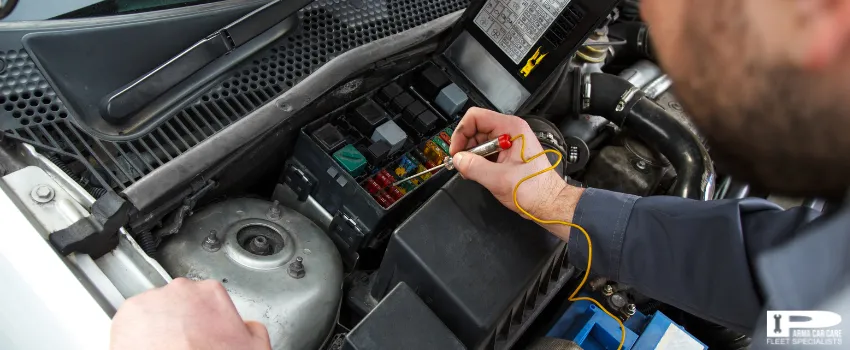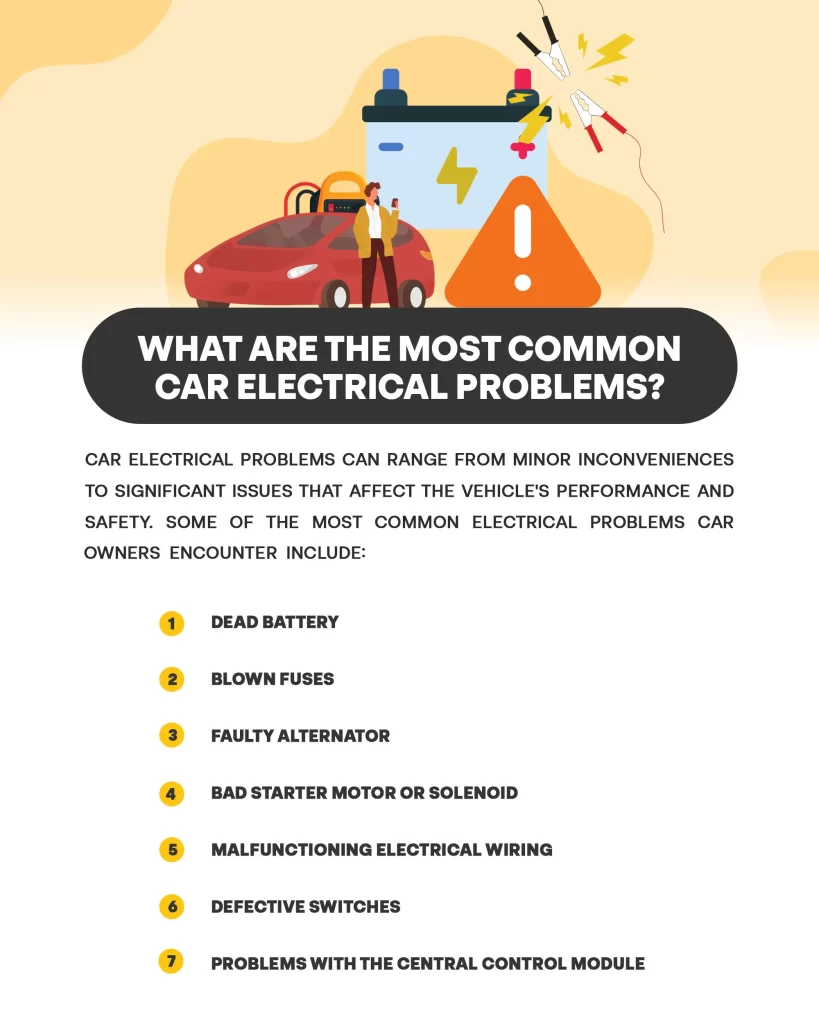When you open the hood of your car, you’ll see various components that work together to make your vehicle run smoothly. While many are familiar with the engine, battery, and other mechanical parts, auto electrical and electronic systems are equally vital but often less understood.
These systems, which include the car’s electrical wiring, controls, and electronic components, play a crucial role in modern vehicles, enabling advanced features like power windows, GPS navigation, and in-car entertainment. Understanding how they work is essential for every car owner, as it can help you identify and address potential issues.
What is the difference between electrical and electronics in a car?
Car electrical work focuses on the wiring and electrical circuits that power the vehicle and enable essential functions, such as starting the engine, operating the lights, and charging the battery. On the other hand, auto electronic systems deal with the complex electronic components responsible for controlling and managing various vehicle features.
In simple terms, car electrical work is like the vehicle’s nervous system, transmitting electrical signals to different parts. In contrast, auto electronic systems act as the brain, processing and interpreting these signals to perform specific functions.
What is the process of the electrical system in a car?
A car’s electrical system follows a specific process to ensure the vehicle’s smooth operation. It starts when you insert the key into the ignition and turn it, which activates the battery and sends an electrical current to the starter motor. The starter motor then spins the engine’s crankshaft, allowing it to start.
Once the engine runs, the car’s electrical system continues distributing power to various components. The alternator, driven by the engine, takes over the power supply, recharges the battery, and ensures a steady flow of electricity. The electrical system also includes circuits and fuses that protect against overloads and short circuits.
What are the electronic components of a car?
The electronic components in a car can vary depending on its make, model, and level of sophistication. Here are some vital electronic components commonly found in vehicles:
1. Engine Control Unit (ECU)
This component manages and regulates the engine’s performance, ensuring optimal fuel efficiency and emissions control.
2. Anti-lock Braking System (ABS) Module
It helps prevent the wheels from locking up during braking, enhancing vehicle control.
3. Airbag Control Module
This electronic component monitors and controls the airbag system, ensuring it deploys in case of an accident.
4. Powertrain Control Module (PCM)
It controls and coordinates the various systems within the powertrain, including the engine, transmission, and, in some cases, the drivetrain.
5. Climate Control Module
This component allows the driver and passengers to set their desired temperature and controls the heating, ventilation, and air conditioning (HVAC) system.
6. Infotainment System
It includes the vehicle’s audio unit, touchscreen display, and connectivity features, such as Bluetooth and smartphone integration.
7. Sensors and Actuators
These electronic devices gather information about the car’s performance and surroundings and initiate actions based on that data.
What are the most common car electrical problems?
Car electrical problems can range from minor inconveniences to significant issues that affect the vehicle’s performance and safety. Some of the most common electrical problems car owners encounter include:
1. Dead Battery
This is often caused by leaving lights or other electrical components on when the engine is off or a faulty charging system.
2. Blown fuses
Blown fuses occur when there is a sudden surge of electrical current or a short circuit, resulting in the loss of power to the affected circuit.
3. Faulty Alternator
When the alternator fails to recharge the battery, it can lead to a drained battery and a loss of power to the electrical components.
4. Bad Starter Motor or Solenoid
These can prevent the engine from starting when you turn the key in the ignition.
5. Malfunctioning Electrical Wiring
This can cause various issues, including non-functional lights, power windows, or other accessories.
6. Defective Switches
When switches, such as those for the lights, wipers, or power windows, fail, the corresponding components may not work.
7. Problems With the Central Control Module
This can result in the failure of multiple electronic systems in the vehicle.
What types of problems can occur in an electrical circuit in a car?
Electrical circuits in a car can experience several problems, including:
1. Open Circuits
These occur when there is a break in the circuit, preventing the flow of electricity. Damaged wiring, loose connections, or blown fuses can cause open circuits.
2. Short Circuits
A short circuit can occur due to exposed wires, damaged insulation, or faulty components. Short circuits often result in blown fuses, melted wires, or, in worst cases, electrical fires.
3. High Resistance
Excessive resistance in an electrical circuit can cause voltage drops and result in dim lights or the failure of specific electrical components. Corroded or loose connections commonly cause high resistance.
Can a bad battery mess up electronics in a car?
Yes, a bad battery can mess up a car’s electronics. The battery serves as the primary power source for the vehicle’s electrical components. When the battery is in poor condition or fails, it can cause several issues:
1. Voltage Fluctuations
A bad battery may not provide a consistent voltage supply, leading to changes in power. These fluctuations can disrupt the regular operation of the electronics and cause them to malfunction.
2. Power loss
In some cases, a bad battery may not be able to supply enough power to the electronics, resulting in partial or complete power loss for affected components. This can lead to features not functioning correctly or not working at all.
3. Damage From Acid Leaks
Acid corrosion can eat away at the wires, causing them to become brittle and potentially break. It can also corrode the terminals and connectors, leading to poor electrical connections and further problems.
What electronics would cause a car to drain its battery?
In many cases, the culprits behind a drained car battery are specific car electrical and electronic systems that continue to draw power even when the engine is off. These systems include:
-
The car’s lights are left on for an extended period.
-
The radio and other audio components can drain the battery if operated when the engine is off.
-
The car’s charging ports and cigarette lighter can power devices even when the engine is not running.
-
The alarm and security systems are designed to remain operational at all times.
-
GPS systems and keyless entry can drain the battery if they are left on for too long.
Can you still drive a car with electrical problems?
The answer depends on the extent and nature of the car’s electrical work. In some cases, you can continue driving, but it’s safer to pull over in others. Here’s a breakdown to help you make the right call:
1. Non-Essential Systems
Car electrical work issues that affect non-essential systems, like the radio or air conditioning, won’t compromise your driving ability. You can still safely reach your destination while enduring a bit of discomfort.
2. Critical Systems
When the problems impact crucial systems, such as the engine control module or the power steering, it’s best to pull over and get professional help.
3. Short Circuit
If the underlying cause is a short circuit or a similar problem that poses a fire risk, you should avoid driving the vehicle until the necessary repairs have been made.
What happens when the electrical system of a car fails?
When a car’s electrical and electronic systems fail, the following can happen:
-
All the electrical components, such as the lights, radio, and power windows, stop working, leaving you in the dark, both literally and figuratively.\
-
The engine may stall if the failure affects critical components like the ignition system or fuel injectors. It’s like the car has lost its will to move.
-
The dashboard warning lights might go wild, flickering like a malfunctioning disco ball.
What are the benefits of electrical and engine control maintenance to a car?
Electrical and engine control maintenance offers several benefits to a car, including the following:
1. It reduces the risk of sudden breakdowns.
Regular maintenance helps identify and address potential issues in the electrical system and engine controls, reducing the risk of unexpected breakdowns.
2. It saves money on repairs.
Timely maintenance can save vehicle owners from costly repairs. Addressing electrical and engine control issues early can prevent further damage to components, eliminating the need for expensive replacements.
3. It ensures optimal fuel efficiency.
When efficient auto electrical systems are well-maintained, they can effectively regulate various engine parameters, ensuring the appropriate balance of air and fuel for combustion.
4. It prolongs the life of the car.
When the electrical system and engine controls are in good working condition, they can also extend the lifespan of other vehicle parts. This reduces the frequency of replacements and saves vehicle owners time and money in the long run.
How can I prevent electrical problems in my car?
Preventing electrical problems in your car starts with these five steps:
1. Regularly check your vehicle’s electrical components.
Inspect your car’s electrical components and look for signs of wear and tear. Addressing these issues early can prevent more significant problems.
2. Don’t overload the electrical system.
Do not exceed the recommended capacity for accessories, such as power outlets and USB chargers. Overloading can cause overheating and damage to the electrical components.
3. Turn off all electrical components when not in use.
Prevent unnecessary strain on the electrical system by turning off all components when not in use. Unplugging any aftermarket devices, such as dash cams or phone chargers, is also advisable to minimize power consumption.
4. Schedule regular maintenance.
Stick to your vehicle’s recommended maintenance schedule. Regular check-ups can catch potential electrical problems before they worsen and ensure your car’s overall health.
5. Seek professional help for electrical issues.
If you experience any electrical issues, it’s best to seek professional help. Attempting to fix the problem yourself can lead to further damage and potentially void any existing warranties.
Key Takeaway
Understanding your car’s electrical and electronic systems is crucial for every vehicle owner. These systems are the backbone of modern vehicles, enabling advanced features like GPS navigation, power windows, and in-car entertainment. Regular maintenance of these systems can prevent sudden breakdowns, save money on costly repairs, and even extend the lifespan of your car.
Knowing the basics of how these car electrical and electronic systems operate can help you identify issues early on and seek professional help before they escalate into more significant problems.
Ensure your car’s peak performance by entrusting it to experts!
Don’t let electrical or electronic issues put the brakes on your journey. If you’re experiencing any problems or just want a regular check-up for your vehicle, look no further than our top-rated auto repair services in Old Brooklyn, OH.
Our team of experts at Parma Car Care Specialists is equipped to diagnose and fix any issues, ensuring your car runs smoothly and safely. Book your appointment today and drive with peace of mind!


















